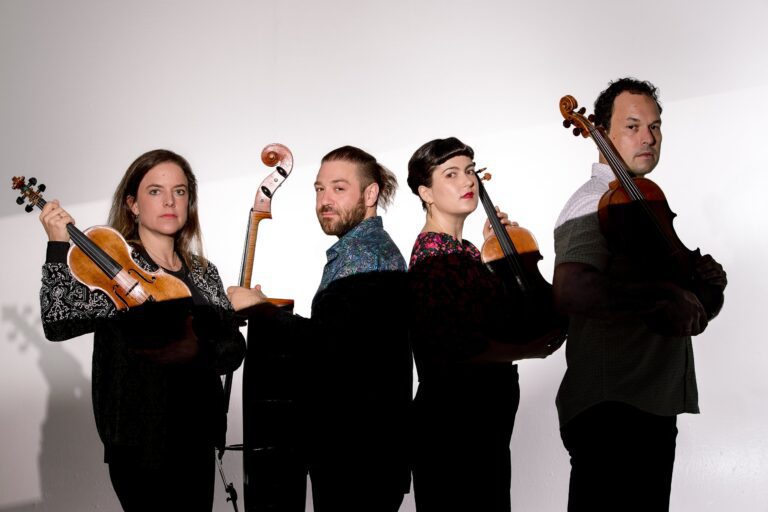Additional Information
The Mivos Quartet has been described as the successor or heir to the Kronos Quartet. The ensemble, founded in 2008 at the Manhattan School of Music, specialises in new music for string quartet, but it certainly has its own personality. Mivos is a regular on labels that focus on the music of today, such as the excellent Kairos. But in 2023, it was with the highly prestigious Deutsche Grammophon label that it recorded the three quartets by Steve Reich, one of the pioneers of American repetitive minimalism. Despite Reich’s fame and the impact of his works, this was curiously the first time that his three quartets had been newly recorded by the same ensemble on the same album. Not content with achieving this recording premiere, the musicians of the New York-based quartet have made it the subject of concerts that can be seen in several major cities. This will be the case in Montreal on Tuesday 1 April 2025, in Salle Bourgie at the Musée des Beaux-Arts. On the occasion of this visit, the first for the group in the city, which will also offer the first opportunity here to hear this complete Reich corpus live, I conducted an interview with the band’s violist Victor Lowrie Tafoya.
PanM 360 : Some people say that you are taking over Kronos. What do you say about that?
Victor Lowrie Tafoya (Quatuor Mivos) : We owe them a lot, like every quartet playing new music of course. I mean, they’re pioneers. But they are still going on strong and we are just doing our own thing. I don’t think we are taking over anything.
PanM 360 : How do you differentiate your repertoire with theirs?
Victor Lowrie Tafoya (Quatuor Mivos) : I don’t know how they would describe what they do, but I’d say that we tend to have a focus more pronounced on American and European experimental music, with things between.
PanM 360 : How did you form, and have you had this focus from the beginning?
Victor Lowrie Tafoya (Quatuor Mivos) : Yes we did. We formed in 2008. We (all the original members, of which only myself and Olivia, the first violinist, remain) were all members of the new Master’s degree Contemporary Performance Program at the Manhattan School of Music.
PanM 360 : How would you describe this program?
Victor Lowrie Tafoya (Quatuor Mivos) : It was new at the time, but since then, other universities have started some like that. It’s a program where academic learning is integrated in actual playing. Many different people from diverse backgrounds created it. I remember we had trainings in India classical music, improvisation, contemporary music theory, chamber group music. So a lot of angles that merge together at some point.
PanM 360 : You have recorded many times for small but excellent labels like Kairos. How did you happen to get a contract with Deutsche Grammophon?
Victor Lowrie Tafoya (Quatuor Mivos) : That was a long time coming. In fact, when we started talking about recording all three quartets, we didn’t even know it was to happen this way. The truth is, the idea came from Steve himself. We played in New York and we got to know him. At some point he mentioned the possibility of recording them all. So, we said ‘’if you think it’s a good idea, well why not?’’ Then it still took many years of getting support and donors before our part-time agent then got us connected with someone and then someone else, and finally it became a DGG thing that we are proud of.
PanM 360 : Curiously, even being such fundamental masterpieces of the contemporary quartet repertoire, they have never been recorded as a whole group before in a single offering. Why is that, do you think?
Victor Lowrie Tafoya (Quatuor Mivos) :
I don’t know. Kronos had a big imprint on them of course, and the last one was created only in 2010. What I can tell you though is that it’s a lot of work to give life to them! Each has many layers of sound recording to be added up. The playing and then the sounds (trains, voices, World Trade Center tragedy, etc.) You have to combine all of those things carefully. It’s a big time investment. Moreover, for these versions, we had support from Steve who got all the sounds remastered. So the quality here is the best available.
PanM 360 : They are even less often played together in concert….
Victor Lowrie Tafoya (Quatuor Mivos) : Well, this is pretty intense music. What is important to know is that Steve’s style is very transparent and it needs continual rhythmic focus and very precise intonation. It may sound easy compared to works with more complex harmonic constructions, but it requires a lot of attention and a lot of energy to remain expressive in the context of cohabitation with prerecorded electronics. If you don’t give it that energy and extreme accuracy, it just becomes background music to the prerecorded elements. What we want is to give this experience a vibrant quality.
PanM 360 : Have you thought of asking him for a new quartet?
Victor Lowrie Tafoya (Quatuor Mivos) : Well no. Not yet. I’m not sure he has time, but if he has, we would certainly be interested.
PanM 360 : How do you evaluate the importance of Reich’s quartet corpus in the vast repertoire?
Victor Lowrie Tafoya (Quatuor Mivos) : I think it’s at the center of it. What he did was pioneering, all those speech patterns turned into melodies. The quartets are like mini operas, they are telling expansive historical stories with text and harmony. We take it for granted now, but it was groundbreaking back then. His esthetic legacy is all over the place now. It will stand the test of time.
DETAILS AND TICKETS FOR THE MIVOS QUARTET CONCERT ON TUESDAY MARCH 1 2025
























